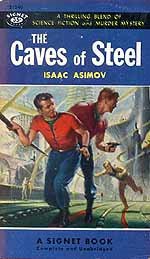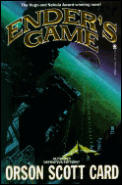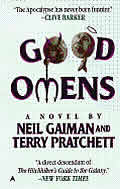
Brady here.
Science fiction in general gets kind of a bad rap. Sure, it's good for summer blockbusters and tv, if it's been gussied up with pretty people and lots of explosions, but most literary critics treat sci-fi like...well, like the cool kids in high school treat the
Babylon 5 fans that speak Klingon at lunch.
So, the other day Mary and I were talking about books, and I asked her if she had ever read any science fiction. None, she says. Mary reads a lot of books. Like, five at a time, weekly. She's probably read ten thousand books (seriously). And not one example of science or "speculative" fiction, with the predictable "high school reading list" exemptions:
Fahrenheit 451, Brave New World, 1984.
This is a shame, and I immediately shoved Issac Asimov's
The Caves of Steel in her face and refused to take it away until she read it and agreed to review it here. (It's got detectives in it, which helped.) So without further ado, here's our illustrious blogmistress:
MM: For the record, I agreed to this series of sci-fi posts mostly because Brady just would not let it go. Finally, I'm like, "Okay, give me an Asimov book or whatever, and I will read it because I love you and because it will probably make you stop bugging me."
At first, I was not impressed. Asimov's vision of the future in this book looks a little something like the
Jetsons, if the Jetsons were Morlocks. But then, Asimov won me over with a simple little passage. Our hero does something, a something so insignificant that it's practically a nothing, that utterly crushes his wife. He doesn't mean to, consciously at least, and they stay happily married and all, but never so happily as they were. It's a nice touch. I was tentatively intrigued.
BP: I'll say this. Asimov's strengths are not those of the prose stylist. When it comes to putting sentences together, he's as dry as Mars in summer. Sometimes his characters take a while to round out, and some of them never do. But Asimov's real secret weapon - along with the occasional nice touches like the one Mary mentions - are his ideas, which are big.
Some plots are driven by the characters, and some narratives are driven by the plot. Asimov's stories are driven by ideas. In
The Caves of Steel, half the fun is seeing the broad strokes of what has become of humanity: living underground, having abolished anything like real privacy while retaining vaguely American middle-class mores, increasingly lifelike robots taking retail jobs away from humans, farming yeast to feed the teeming masses, and living in constant fear of being "declassified" and thus spending the rest of your life sleeping in the community barracks. Oh, and everyone is deeply agoraphobic.
MM: The city dwellers are also highly xenophobic. In addition to the anti-robot sentiment - a near riot breaks out at a shoe store that has just leased robot shoe salesmen - the city dwellers also hate the Spacers, the humans who were sent out to colonize the outer planets. The Spacers maintain an outpost on Earth, wear noseplugs when they come into contact with city folk, and decontaminate themselves after associating with them. This is, of course, perceived as a slight.
A Spacer is murdered at the outpost, most likely by city folk, and our hero - Elijah Bailey, a detective with the NYPD - is enlisted to solve the crime, and partnered with a Spacer robot for the job.
BP:Poor Elijah has a lot to deal with. His witnesses are convinced he carries the plague, his new partner is a robot who was built by the murder victim to look exactly
like the murder victim, and the first time he stages a "parlour scene" to lay out exactly whodunit and solve the case, he accuses the one person who absolutely could not have had anything to do with it. In front of his own boss, who is not amused. If Elijah can't solve the case, it's declassification for him and his family.
Oh, and the future of space colonization kind of depends on him solving the thing, as the Spacers are in a position to quarantine, if not destroy, the Earth if the killer can't be found.
The book does start a little slow, but picks up steam as Elijah and R.(Robot) Daneel Olivaw track down the killer, venturing out into the city. We're treated to radical blocs of yeast farmers, "man-jams" on moving highways where commuters stand still while the road under them moves at forty-five miles per hour, and status heirarchies based on things like being allowed to have your own kitchen instead of using the community cafeteria.
I like to call this stuff "social science fiction," because what's really interesting here isn't the technology, but the changes in everyday life. Overcrowding is, to our hero, the "warm, living pulsation of the city" while actual motorways, deserted and only used for emergency vehicles and the like, are miles of "indecent emptiness" that depress Elijah.
And of course, on top of all the speculative fiction you get a murder mystery: two genres for the price of one.
MM: It occurs to me that science fiction is really not so different from other fiction, except for the kind of imagination that writers employ to carry it off. There's the kind of imagination that allows Jonathan Franzen to convey a character's dementia or Jeffrey Eugenides to create an incestuous family saga, and then there's the kind of imagination that gives you robots in a yeast-eating dystopia.
I think I like that kind of imagination. It takes itself very seriously at the same time it throws everything we know to be true and real and serious over the wall, and sometimes, into outer space. When you think about it, that's kind of cool.
Asimov: 1
Mary's Preconceived Notions: 0
Next time...
Ender's Game.












